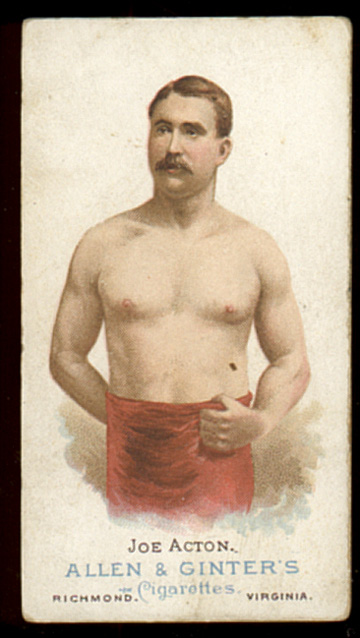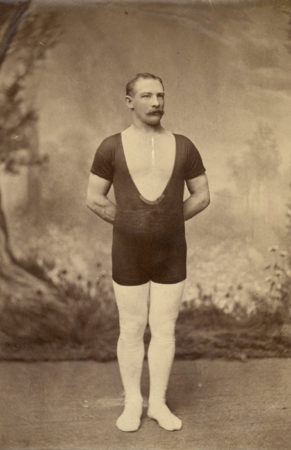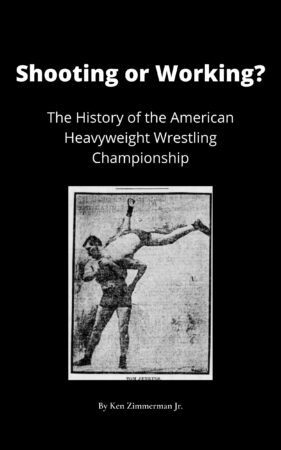Englishmen Wrestle for American Title
August 7, 1882, American Heavyweight Wrestling Champion Edwin Bibby defended his title against English Champion Joe Acton at Madison Square Garden in New York City. The men wrestled a “catch-as-catch-can” match for the world championship. However, the public did not recognize the winner of the bout as the world champion. The public recognized the winner as the American Heavyweight Wrestling Championship.
Joe Acton, “The Little Demon”, travelling to the United States to wrestle was unwelcome news for Edwin Bibby. Except for William Muldoon, Bibby defeated all the rest of his opponents in America. Acton wrestled Bibby five times in England before Bibby left for the United States. Acton defeated Bibby all five times.

Joe Acton from a 19th Century Illustration (Public Domain)
The men agreed to wrestle for a $1,000 purse. They also agreed to ban submission holds. Both wrestlers were skilled catch wrestlers with strong submission skills. They would only agree to such a ban to prevent a severe injury in the bout.
Av 8:30 pm, 300 spectators entered the arena to watch the contest. The low turnout disappointed the promoters, local sporting men. However, matches drew crowds in the hundreds not thousands in the early years of American professional wrestling.
Acton and Bibby stepped onto the raised platform, where attendants placed a thick carpet. Wrestlers and promoters transitioned to wrestling rings in the early 20th Century. Both men performed a vigorous warm up before the match as they were freely perspiring.
Joe Acton was 29 år gammel. He stood five feet, five inches tall and weighed 148 pounds. Edwin Bibby was 33 år gammel. He stood five feet, four inches tall and weighed 153 pounds.
Referee Harry Hill stepped on to the platform to loud cheers. He signaled for the match to begin. Acton slipped behind Bibby and took him down on all fours. Bibby tried rolling away from Acton but was unable to escape this way. He finally stood to his feet and broke Acton’s grip from his waist.
Acton secured the same behind-the-back waist hold and took Bibby back to the mat. Bibby ended up on his hands and knees again. Bibby rolled around the mat frantically, but Acton stayed on top of Bibby.
Every time Bibby rolled across the mat, Acton’s second Mr. Chambers would yell, “Fall.” Referee Hill kept waving him off. Endelig, Mr. Hill turned to Mr. Chambers and told him, “Be quiet and second your wrestler.” The ringside fans cheered Hill, who had a solid reputation for fair officiating.
Etter 38 minutes of Acton grinding down Bibby as Bibby tried to escape his hands and knees position, Acton flipped Bibby over Acton’s head onto Bibby’s head and shoulders. Hill awarded the first fall to Acton after 38 minutter.

Edwin Bibby inn 1884 fra Public Domain
After the intermission, the men took their position on the platform. Bibby clearly showed the effects of the first fall. Bibby’s knees were bleeding, and his back was red from his attempted escapes on the carpet.
Acton took Bibby down to the carpet in the same hands and knees position. Bibby attempted a futile escape but was stuck into the same position. After a minute or two, Acton flipped Bibby to his back. Acton straddled Bibby chest-to-chest and pressed Bibby to the carpet for the second fall and match. The fans would not recognize Acton as World Champion, but he was the new American Heavyweight Wrestling Champion.
Ironisk, the first two title holders of the American Championship were Englishmen, who weighed less than 160 pounds. However, both men defeated larger wrestlers through their superior catch wrestling skills.
The fans left the arena happy but the same could not be said for the promoters. The small crowd failed to generate enough money to pay for the building rental. The arena rental led to a large monetary loss for the promoters.
You can leave a comment or ask a question about this or any post on my Facebook-side.
Sources: The New York Times, August 8, 1882 edition, p. 2


